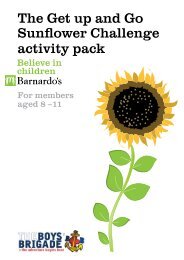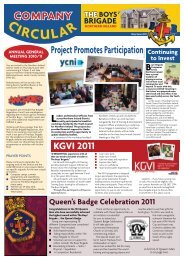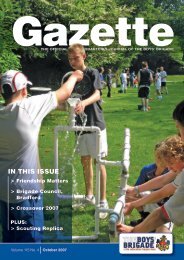In this issue
July 2008 - The Boys' Brigade
July 2008 - The Boys' Brigade
- No tags were found...
Create successful ePaper yourself
Turn your PDF publications into a flip-book with our unique Google optimized e-Paper software.
HERE & THERE<br />
News from Paisley<br />
BB demo at Rocks Game<br />
On 16th March the Scottish Rocks,<br />
Scotland’s only professional basketball<br />
team, had a home match against<br />
Birmingham at the Braehead Arena.<br />
There was a pleasant surprise for<br />
spectators at half time. Rocks’<br />
management had arranged for the<br />
Paisley & District Battalion to stage a<br />
special BB Display. There were seven<br />
minutes of simultaneous displays by<br />
all three sections. <strong>In</strong> the centre, 20<br />
Anchor Boys from 1st Erskine, 15th<br />
Paisley and 3rd Johnstone companies<br />
showed games which can be played<br />
using a parachute. At one end of the<br />
court, 10 boys from 3rd Renfrew Junior<br />
Section put heart and soul into getting<br />
round a very varied ‘potted sports’ circuit. At the other end, gymnastics were<br />
performed by 12 Seniors from 1st Neilston, 3rd Johnstone and 1st Bridge of<br />
Weir companies. The Display was much appreciated by the spectators and<br />
the Rocks’ General Manager, Bruce Cook, said he would be delighted to<br />
have the BB back on future occasions.<br />
Competition Day<br />
Results:<br />
<strong>In</strong> March the Battalion held its annual<br />
Junior Section Competitions Day at<br />
Wallneuk North Church Halls, and 4-boy<br />
teams entered from 11 companies. The<br />
three competitions were Arts & Craft,<br />
Bible Knowledge and Potted Sports.<br />
The boys were asked to make a door<br />
handle sign for Arts & Crafts.<br />
Potted Sports:<br />
1st 1st Neilston (Graeme Milloy, Stephen Milloy, Grant Alexander,<br />
Jack Harris)<br />
2nd 24th Paisley (Iain Craig, Alexander Gilmour, Samuel Everett,<br />
Craig McDonald)<br />
3rd 1st Kilbarchan (James Murphy, Colin Robertson,<br />
Jack Jamieson, Joe Barratt)<br />
Arts & Crafts:<br />
1st 11th Paisley (Fraser Boyd, James Wilcox, Ciaran Blyth, Greg Kerr)<br />
2nd 1st Kilbarchan (as above)<br />
3rd 22nd Paisley (Owen Kelly, Teddy Gallagher, Reece Laiolo,<br />
Jack MacPherson)<br />
Bible Knowledge:<br />
1st 11th Paisley (as above)<br />
2nd 24th Paisley (as above)<br />
3rd 1st Kilbarchan (as above)<br />
Paisley & Dist Batt –<br />
Junior Section Comp Day<br />
DEA Silver in the<br />
Peak District<br />
Members of<br />
the 2nd Enfield<br />
and 10th Enfield<br />
Companies<br />
completed<br />
their Duke of<br />
Edinburgh’s<br />
Award Silver<br />
Expedition in the<br />
Peak District in James in Snow<br />
early April. The<br />
team consisting of John Murfitt, Ben Hall,<br />
Mark Griffiths and James Norman spent<br />
4 days and 3 nights walking around the<br />
Vale of Edale including Mam Tor in varying<br />
weather conditions which included sun,<br />
cloud, rain, wind and lots of snow!<br />
Enfield Expedition – Group at end of Expedition<br />
President’s Badges<br />
Mr John Young MBE, Brigade Vice President<br />
presented President’s Badges to members of<br />
43rd Belfast: (l to r) Robert Cairnduff, Drew<br />
Vincent, Adam Fardiner, David Johnston.<br />
Thank you<br />
The 1st Denton Company would like to thank<br />
Costain for their generosity in donating £220<br />
towards the purchase of a new gas cooker for<br />
use at their annual summer camps. Costain in<br />
the Community (CITC) is a scheme designed<br />
to benefit charitable/volunteer organisations<br />
such as The Boys’ Brigade, whilst promoting<br />
Costain’s reputation as a considerable<br />
contractor. The new cooker will enable<br />
campers to continue having excellent food<br />
in a safe cookhouse.<br />
Youth of Living Water<br />
Democratic<br />
Republic of<br />
The Challenges of DR Congo<br />
Despite Congo’s wealth of resources<br />
there has been much conflict in trying<br />
to gain control of its minerals. As a<br />
result of <strong>this</strong> DR Congo has been<br />
engaged in civil war for many years with<br />
over 4,000,000 having lost their lives.<br />
Zaire gained independence from<br />
Belgium in June 1960 and became<br />
known as Congo. However General<br />
Mobutu, Chief of the Army, led a coup<br />
in 1965 seeking to gain control of the<br />
mineral rich Katanga province.<br />
<strong>In</strong> October 1996 dissident groups led by<br />
Laurent Kabila and supported by rebels<br />
in Rwanda and Uganda rose in revolt.<br />
Children joining the rebel army or the Youth<br />
of Living Water – one path leads to death the<br />
other offers hope for the future.<br />
Kabila declared himself President with<br />
Mobutu fleeing to Morocco.<br />
However in summer 1998 yet another<br />
rebel group announced itself, again<br />
backed by Rwanda and Uganda and<br />
further conflict broke out. A ceasefire<br />
was signed in August 1999 but in<br />
January 2001 President Kabila was<br />
assassinated by one of his bodyguards.<br />
His son Joseph took over as the new<br />
Head of State in January 2001 and<br />
proved to be more open to negotiations.<br />
A transitional national government was<br />
formed in 2003. This, at least formally,<br />
ended the war. The first democratic<br />
elections for over 40 years took place in<br />
July and October 2006. Joseph Kabila<br />
was elected President but any progress<br />
is slow.<br />
Congo<br />
The situation has left DR Congo in<br />
a state of absolute desperation.<br />
• Hundreds of thousands of people<br />
have been displaced creating a<br />
humanitarian disaster with many<br />
having no hope of home, food,<br />
health, education or income.<br />
• High ethnic tension remains in the<br />
East and North-East of the country.<br />
• Justice for victims who have had<br />
their human rights abused is sparse.<br />
• The education and the public health<br />
system are both shattered.<br />
• Mass widespread corruption.<br />
• There has been a national economic<br />
collapse. The DR Congo is ranked<br />
near the bottom of countries on<br />
the 2007 Human Development <strong>In</strong>dex<br />
at 168 out of 177 .<br />
• Violence and insecurity continues.<br />
• Armed forces continue to pose a<br />
threat to civilians.<br />
• There are frequent reports of<br />
civilian executions.<br />
• Widespread rape and sexual<br />
violence continues.<br />
• Banditry and forced labour<br />
is common.<br />
• Over 30,000 children have been<br />
forced into rebel armies and<br />
<strong>this</strong> continues to occur.<br />
Youth of Living Water<br />
Originally called The Boys’ Brigade<br />
but for obvious political reasons<br />
YOLW has had to gain a new identity.<br />
It operates in the South East of the<br />
country in the mineral rich Katanga<br />
province, which is around the size<br />
of France. They offer a weekly<br />
programme through a number<br />
of groups across the province<br />
for around 2000 boys and girls.<br />
The National Secretary is Mr Jean<br />
Tshiswaka from the Anglican Church.<br />
Apart from discipling young people to<br />
follow Christ along the lines of the Brigade<br />
methodology, the focus is on seeking to<br />
develop the young person’s character<br />
within the context of their culture. They<br />
therefore have an emphasis on social<br />
development. Seminars are regularly held<br />
on <strong>issue</strong>s such as HIV/AIDS, employment,<br />
human rights, poverty etc. They also run<br />
a number of small vocational training<br />
and income earning initiatives such as<br />
pig rearing, maize growing and rental of<br />
wedding gowns.<br />
Here members from YoLW learn how to grow<br />
and then sell maize<br />
To assist young people in “fighting” the<br />
aftermath of the war, they have established<br />
a Skills Training Programme. The objective<br />
is to train young people through a 9 month<br />
apprenticeship school. It will teach students<br />
carpentry or tailoring skills leading to<br />
gainful employment and the ability to take<br />
responsibility for their own lives. The first<br />
intake has 12 students and they propose<br />
to double <strong>this</strong> number each year.<br />
At the end of the 9 month period the<br />
products the youth have made will be<br />
sold through local markets. Some of the<br />
income will be invested in the further<br />
development of the school but the youth<br />
will also receive a commission..<br />
Given the recent history of the country,<br />
there is no guarantee that the youth will<br />
find external employment on completion<br />
of their course. At the very least however<br />
they will have learnt skills that will bring<br />
income to their families through the<br />
establishment of micro-enterprise.<br />
96 The Boys’ Brigade Gazette July 2008 July 2008 The Boys’ Brigade Gazette 97

















